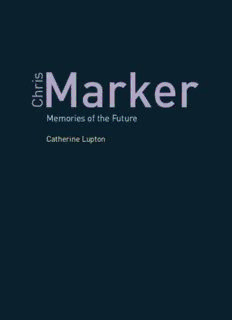Table Of ContentMarker
s
i
r
h
C
Memories of the Future
Catherine Lupton
Chris Marker
Chris Marker
Memories of the Future
Catherine Lupton
reaktion books
For Donald Richie
Published by Reaktion Books Ltd
33
Great Sutton Street
ec1v 0dx, uk
London
www.reaktionbooks.co.uk
2005, 2006, 2008
First published reprinted
2005
Copyright © Catherine Lupton
All rights reserved
No part of this publication may be reproduced, stored in a retrieval system,
or transmitted, in any form or by any means, electronic, mechanical, photocopying,
recording or otherwise, without the prior permission of the publishers.
Printed and bound in Great Britain by Cromwell Press, Trowbridge, Wiltshire
British Library Cataloguing in Publication Data
Lupton, Catherine
Chris Marker: memories of the future
1
. Marker, Chris – Criticism and interpretation
I.Title
791.4'3'0233'092
isbn-13: 978 1 86189 223 2
isbn-10: 1 86189 223 3
Contents
Introduction: Free Radical 7
1 The Invention of Chris Marker 13
2 Travels in a Small Planet 40
3 A Moment in Time 77
4 A Grin Without a Cat 109
5 Into the Zone 148
6 Memories of the Future 177
Conclusion: The Eye That Writes 217
References 218
Bibliography 237
Filmography 243
Acknowledgements 252
Illustration Credits 253
Introduction: Free Radical
Chris Marker is a towering and seminal figure in the field of contemporary
visual culture, but until very recently one of its best-kept secrets. In an
astonishingly diverse career that now spans more than half a century,
Marker has embraced writing, photography, filmmaking, videography,
gallery installation, television and digital multimedia in order to probe the
deep cultural memory of the twentieth century through the filter of his own
utterly distinct sensibility, at once erudite and funny, tender and incisive.
1940
Marker emerged in late s Paris as a writer already alert to the formal
qualities and cultural significance of cinema and the visual image. He then
proceeded to bring to filmmaking the style and analytical powers of the
literary essay, in a series of groundbreaking travelogues released in the
1950 1960 1958
late s and early s, among which Lettre de Sibérie( , Letter from
1962
Siberia) remains the most famous. Two films made in broke open this
mould: La Jetée, the haunting science-fiction fable told in still photographs
and an instant of movement that remains his best-known film; and Le Joli
mai, which upturned Marker’s reputation as the master of voice-over
commentary by making interviews the central plank of its topical investi-
gations. The human exchanges of Le Joli maipaved the way for Marker’s
1967
immersion in militant left-wing film collectives for a decade after . He
1960
went on to take stock of the revolutionary upheavals of the s in the epic
1977 1982
Le Fond de l’air est rouge( ), then in brought together his passion
for travel and his abiding concern with history and cultural memory in
the landmark Sans soleil(Sunless), a masterpiece of the personal essay film
genre that Marker has made his own. By incorporating images that had
7
been manipulated with a visual synthesiser, Sunless served notice of
Marker’s enthusiastic adoption of new electronic media technologies.
1980 90
During the s and ’ s he began increasingly to work with video and the
computer, and to diversify from film into television projects and multimedia
83
gallery installations. Today, aged (or thereabouts), Marker is the grand
old man of new media, a still-active pioneer who has recently used digital
cd-rom
hypermedia and the storage capabilities of the to create Immemory
1998
( ): a virtual map of a lifetime’s memory, drawn from his capacious
personal archives.
The singularity and diversity of Marker’s achievements set him at a
remove from most other filmmakers and artists, even though close collabo-
ration with friends and contemporaries has been a constant element of his
work. Marker has drawn significant inspiration from the innovative chron-
iclers and observers of the early Soviet cinema, Dziga Vertov and Esfir Shub,
and paid direct homage to the influence of Shub’s successor in the compila-
1
tion documentary genre, Nicole Védrès. Among the celebrated directors
1950
who formed the nucleus of the French New Wave at the end of the s,
including Jean-Luc Godard, François Truffaut, Alain Resnais and Agnès
Varda, Marker alone bypassed the route of entry via a transition to the nar-
rative fiction feature film. The starkly original short La Jetéeremains his sole
foray into pure fiction, and was itself undertaken during the production of
Le Joli mai: a novel exploration of new possibilities in direct documentary
recording. When the iconoclastic force of the New Wave receded in the sec-
1960
ond half of the s, and many of its directors settled safely back within
known cinematic bounds, only Marker and Godard stood out in their par-
allel, if very differently manifested, commitments to both media innovation
and political efficacy. The paths of these two veterans continue to hold out
intriguing comparisons: Godard chiselling away at the edifice of cinema
from within, Marker skirting through and across it in his protean engage-
2
ments with other media. In more recent years, Marker’s move into creating
gallery installations that recycle elements of his film work has anticipated a
wider export of cinematic traces and fragments into the space of the gallery,
evident in exhibits by directors such as Chantal Akerman, Atom Egoyan,
Isaac Julien and Harun Farocki that press at the distinctions between cinema
3
and installation art.
8
Description:Chris Marker is one of the most extraordinary and influential filmmakers of our time. In landmark films such as Letter from Siberia, La Jet?e, Sans Soleil, and Level Five, he has overturned cinematic conventions by confounding the distinction between documentary and fiction, writing and visual recor

